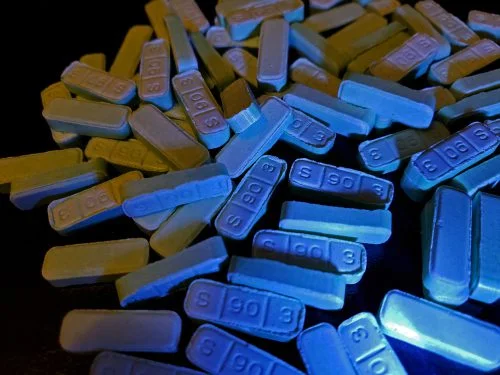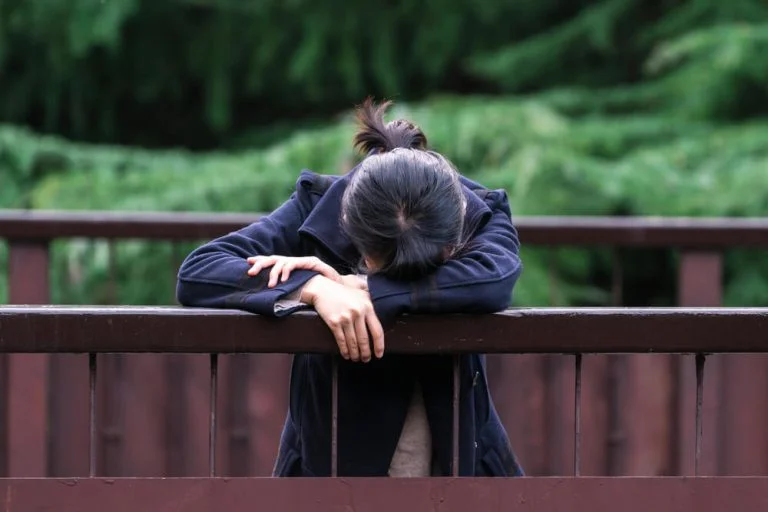Xanax (Alprazolam)
Alprazolam is a psychoactive benzodiazepine medication that is used for the treatment of generalized anxiety disorder (GAD) and panic disorder.

Common Brand Names: Xanax, Niravam, Gabazolamine-05, Xanax XR
Like other benzodiazepines, alprazolam works by binding to gamma-aminobutyric A (GABA-A) receptors within the central nervous system. Studies suggest that activation of these receptors plays a role in benzodiazepine’s sedative, anxiolytic, amnesic, and ataxic effects. Alprazolam is a Schedule IV substance under the federal drug scheduling system, which means that it has low abuse potential and low risk of dependence. However, chronic abuse of alprazolam, especially among patients with a history of substance misuse, can still lead to addiction.
What Alprazolam Is Used For
Alprazolam has a U.S. FDA approval for generalized anxiety disorder (GAD) and panic disorder. Off-label, alprazolam can be prescribed to treat:
- Insomnia
- Premenstrual syndrome
- Depression
However, Alprazolam is contraindicated in patients with known allergies or hypersensitivity to the drug or to any of its components. The typical precautions in using this drug in patients with impaired renal, hepatic or pulmonary function should also be observed.5
How Alprazolam Is Abused
While alprazolam is one of the most prescribed medicines for the therapeutic treatment of GAD and panic disorder, it is also commonly abused, usually through the following methods:
- Consumption of amounts that are more than the maximum acceptable daily dose (10mg)
- Consumption in ways that are not prescribed by physicians
- Crushing and snorting alprazolam bars or planks
- Chewing bars or planks
- Taking the drug together with other substances like alcohol and opioids
These methods are typically done to hasten the onset of the drug’s effects while also increasing its potency. However, repeated alprazolam abuse over time can build up a person’s tolerance and make them dependent on the drug. The drug may even produce emotional or physical dependence even when used as recommended.
Alprazolam Drug Interactions
Several types of substances can interact with alprazolam when taken together with this drug. These include:
- Central nervous system (CNS) depressants: Alprazolam may produce more CNS depressant effects when combined with psychotropic medications, anticonvulsants, antihistaminics, alcohol, and other substances that also produce CNS depression.
- Tricyclic antidepressants: The steady state plasma concentrations of the drugs imipramine and desipramine have been shown to increase by the concomitant use of alprazolam.
- CYP3A4 inhibitors: Drugs that have been shown to possess CYP3A4 inhibitors of clinical significance may delay the metabolism of alprazolam in the liver. These include fluoxetine, propoxyphene, and some oral contraceptives.
- Herbal preparations: Concomitant use of alprazolam and kava can result in an individual experiencing a semi-comatose state, while use with St. John’s wort has been demonstrated to lower the plasma concentration of alprazolam in the body.
Alcohol and street drugs are among the most common substances taken in combination with alprazolam. Individuals are warned that misusing alprazolam in this manner can increase the risk of serious and life-threatening side effects.
Why Alprazolam or Xanax Is so Popular as a Recreational Drug
Alprazolam is the most commonly prescribed benzodiazepine drug in the United States. Because of its relaxing, anxiolytic, and euphoric properties, alprazolam is often used as a recreational drug and has been implicated in many cases of substance use disorder. In recent years, alprazolam has been the culprit for many deaths resulting from drug overdose.
Here are just some of the reasons why it is so popular:
- Pharmacokinetic properties: Alprazolam has a rapid metabolism, short-half life, and high potency, making people take it more frequently and in higher doses than prescribed.
- Relief from illness: People suffering from anxiety and panic disorder get a sense of relief and relaxation from taking alprazolam.
- Control of symptoms: The drug helps users gain focus and control symptoms that result from anxiety or fear, such as hyperventilation and an increased heart rate.
- Relief from mental and emotional trauma: Alprazolam also has anesthetizing effects, making it useful for people undergoing an emotional or mental trauma.
- Easy to obtain: Alprazolam is highly accessible; the drug can be obtained from friends or family members who were prescribed the medication.
- It is cheaper compared to other common benzodiazepines in the market, making it prone to misuse.
Alprazolam’s Side Effects
Like any other medication, alprazolam may produce unwanted side effects that range from mild to life-threatening. Common side effects may include:
- Drowsiness
- Fatigue or tiredness
- Irritability
- Memory impairment
- Dizziness or lightheadedness
- Insomnia
- Headache
- Cognitive Disorder
- Dysarthria
- Dry mouth and decreased salivation
- Constipation
- Diarrhea
- Nasal congestion
- Tachycardia/palpitations
Some adverse effects are potentially dangerous. Seek help from a medical professional or call 911 immediately if you or another individual are experiencing the following symptoms:
- Shortness of breath
- Seizures
- Confusion
- Slurred speech
- Severe skin rash
- Diminished coordination or balance
- Jaundice or yellowing of the skin and eyes
Long-Term Effects of Alprazolam
Chronic use of alprazolam can also lead to some long-term side effects, including the following:
- Decreased libido
- Suicidal ideation
- Mania and hypomania
- Problems with concentration, sleep, and memory
Signs of Alprazolam Overdose
The clinical manifestations of alprazolam overdose are similar to those of other benzodiazepines. Alprazolam overdose has been associated with deaths, which is why it is important to call 911 immediately if you observe any of the following symptoms in yourself or another individual:
- Drowsiness
- Confusion
- Slurred speech
- Loss of coordination or balance
- Fainting or loss of consciousness
- Low blood pressure
- Difficulty breathing or shortness of breath
- Seizures
Additionally, it is important to note that fatalities have been reported in individuals that have overdosed on alprazolam and alcohol. The FDA notes that alcohol levels observed in some of these patients have been lower than those usually associated with deaths induced by alcohol alone.
Symptoms of Alprazolam Addiction
Chronic alprazolam misuse or abuse can lead to an addiction, which is characterized by uncontrollable use, despite the negative consequences.
The Diagnostic and Statistical Manual of Mental Disorders, Fifth Edition (DSM-5) provides a criteria for substance use disorders, and these include the following symptoms for alprazolam:
- Using alprazolam in larger amounts or for longer than intended
- Wanting to cut down or stop using alprazolam, but not managing to
- Spending a lot of time to get, use, or recover from alprazolam use
- Experiencing strong cravings for alprazolam
- Inability to manage commitments due to alprazolam use
- Continuing to use alprazolam, even when it causes problems in relationships
- Giving up important activities because of alprazolam use
- Continuing to use alprazolam, even when it puts you in danger
- Continuing to use, even when physical or psychological problems may be made worse by use
- Increasing tolerance to alprazolam
- Experiencing alprazolam withdrawal symptoms when you abruptly quit
Alprazolam Withdrawal Symptoms
Abrupt cessation of alprazolam after chronic use may also lead to unwanted withdrawal symptoms, such as:
- Heightened sensory perception
- Impaired concentration
- Disordered smell perception (dysosmia)
- Clouded senses
- Burning or prickling sensation in the limbs (paresthesias)
- Muscle cramps
- Muscle twitch
- Diarrhea
- Blurred vision
- Decrease in appetite
- Weight loss
If your body goes through these side effects, it could mean that you have developed a dependence on alprazolam. Your body could still become dependent on the drug even if you don’t develop addiction, a condition characterized by continued use of the drug despite its negative consequences. It is important to seek help from a medical professional who can guide you in developing the right strategy for gradually removing the drug from your system.
Alprazolam Detox
Because certain adverse effects of alprazolam are directly related to dependence on the drug, one of the first interventions that must be done for patients suffering from alprazolam use disorder is a process called detoxification, or detox.
In detox, alprazolam is slowly eliminated from the body in order to prevent acute withdrawal, reverse physical dependence, and achieve a substance-free state. Here are just a few of the things patients can expect during an alprazolam detox program:
- A team of dedicated professionals will be available at the detox facility to make sure you are comfortable and safe through the detox process. You may be given IV fluids, nutritional supplements, and medications if determined clinically appropriate.
- Detox can be done by gradual dose reduction or drug replacement therapy or both.
- Some patients may require a slower dose reduction if they begin to develop withdrawal symptoms.
- Long-term alprazolam misuse patients are recommended to switch to a longer half-life benzodiazepine such as diazepam. This approach has been proven to be effective in reducing withdrawal side effects.
Getting Treatment for Alprazolam Addiction
Alprazolam’s potential to be addictive can be attributed to its rapid metabolism, short half-life, and high potency. Because it is eliminated from the body rapidly, its effects also tend to wear off quickly, and there is a tendency for patients to take more of the drug to be able to maintain its desired effects. Chronic abuse of this drug can lead to addiction.
If you are struggling with alprazolam use disorder, professional treatment can help you. Alprazolam rehabilitation programs can be done either on an outpatient or an inpatient basis.
- Outpatient alprazolam addiction treatment: In general, an outpatient rehab arrangement is more suited to lower-risk patients who experience a milder form of addiction and who can guarantee treatment compliance. If you’re undergoing outpatient treatment, you get to continue living at home while you regularly attend therapy and counseling at a treatment center. You also have more freedom in terms of being able to go about many of your everyday routines, like going to school or work and enjoying many of the same activities you’re used to doing.
- Inpatient alprazolam addiction treatment: On the other hand, residential or inpatient rehab may be more appropriate for high-risk patients who exhibit moderate to severe addiction symptoms and to those whose treatment compliance cannot be guaranteed. In short, these patients would benefit from round-the-clock medical supervision and will receive a combination of treatment modalities, like individual therapy, group counseling, family therapy, and drug education classes.
When undergoing addiction treatment, you may be asked to go through psychotherapy. Studies have shown that gradual benzodiazepine dose reduction, when combined with psychological treatment, is more effective at helping patients achieve benzodiazepine discontinuation than gradual dose reduction alone. The process of drug rehabilitation can be long and difficult, and these psychotherapeutic programs aim to provide a strong support system to patients as they battle their way through recovery. These sessions may be facilitated by counselors or people who have recovered from addiction themselves.
For any rehab program to be effective, it must be individualized and patient-centered. A comprehensive patient evaluation that includes complete history taking, physical examination, and laboratory workups is warranted before initiating any intervention to ensure that these strategies are appropriate for the patient’s individual needs.
Get the Help You Need Today
If you or a loved one is dealing with alprazolam addiction, you’ll be glad to know that most insurance plans provide some level of coverage for addiction treatment services, no matter if it’s for inpatient or outpatient treatment of addiction. There are also plenty of other ways to finance your alprazolam addiction treatment even if you don’t have insurance.
Call us now at (800) 429-7690 to speak to a recovery support advisor. They can check the extent of your insurance coverage and will help you find an appropriate treatment facility.
A Brief History of Alprazolam
Alprazolam was first synthesized by Jackson B. Hester at the pharmaceutical company then known as Upjohn, which is now part of Pfizer, Inc. Alprazolam was originally developed as a muscle relaxant that would help in the management of insomnia. Eventually, scientists also discovered alprazolam’s benefits on panic and anxiety disorders.
In 1969, Upjohn submitted a New Drug Application for alprazolam. In the same year, it received its patent. The U.S. FDA approved alprazolam for the treatment of generalized anxiety disorder and panic disorder in 1981 and was soon introduced to the market under the trade name Xanax. It was the first benzodiazepine to receive a U.S. FDA approval for panic disorder. It was also in the same year when alprazolam was listed as a Schedule IV drug by the Drug Enforcement Agency under the Controlled Substances Act.







